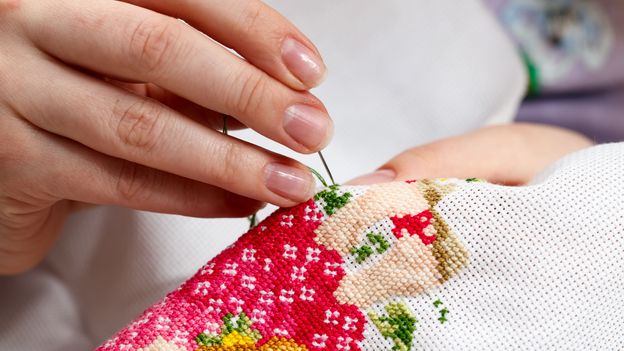Embroidery is enjoying a resurgence as a new generation taps into its potential – both for upcycling clothes and for making an empowering declaration. Here’s our DIY guide to embroidering your own clothes.
In the exhibition Unravel: The Power and Politics of Textiles in Art at London’s Barbican, artist LJ Roberts displays three small textile artworks depicting queer parades and protests. The works, part of Roberts’s series Carry You With Me: Ten Years of Portraits, are caught between panes of glass so that visitors can see the back of each embroidery, with knots and incidental threads on show. “Working in textiles mirrors the flexibility and resilience that often permeates queer and trans survival and thriving,” writes the artist on their website. “The embroideries demonstrate that art centering kinship, persistence, and connection can be made anywhere at any time.”
…
The resurgence is due, in no small part, to the need to confront the fashion industry’s damaging impact – on everything from carbon emissions to planetary boundaries, from animal rights to racial justice. Almost 70% of all clothes are synthetic, while 40% of all clothes produced never even make it to retail; only 2% of garment workers, mainly women, are paid a living wage. The key driver is over-consumption. More and more sustainable fashion activists are calling for the imaginative re-use, through upcycling and repair, of what already exists – and one way to do this is decorative embroidery.



I really like being able to do basic tailoring. Like, I grew up surrounded by media that made me view my body as flawed because of all the ways it deviated from the norm. The combo of broad shoulders and big boobs made it impossible to find fitting clothes that weren’t a tent on me. Being able to modify garments that I find, and repair the few items that fit me perfectly has been a big confidence boost.
Missing out on seeing this stuff on social media is probably for the best - a lot of craft content on social media tends to be very “influencer” shaped, where the goal is to make beautiful things look effortless, and that can be demoralising when it’s all you see.